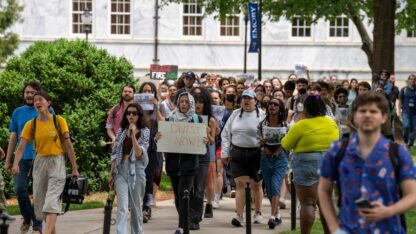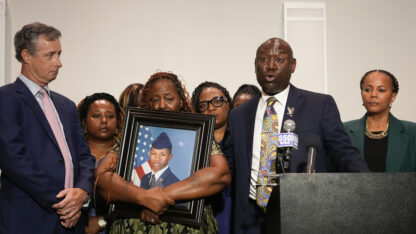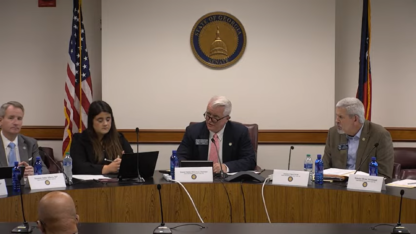Ga. Lawmaker Withdraws Bill Banning Face Veils In Public

AP Photo/Jon Super
A South Georgia lawmaker withdrew a proposal Thursday evening that would have prohibited people from wearing face veils or masks in public.
Republican State Rep. Jason Spencer of Woodbine, Georgia said he faced “political scrutiny” on the pre-filed legislation, which was opposed by both Republican and Democratic state lawmakers.
Face Veils
Nabila Khan, 18, is a biology major at Georgia State University. She’s a Muslim woman who covers her face, but said she always removes it when asked by security officers or to take photos.
“The face veil does not make me any less human. I wear it to school, I wear it to work. I wear it to all public places. I can drive perfectly with it,” Khan said. “I just wish people would understand that I’m a normal girl, going to college, getting my education, working. As Muslim women, we have no intention to conceal our identity or to harm anyone.”
She said it was her choice and how she personally observes modest dress requirements in Islam.
“I know a lot of people have the misconception that Muslim women are oppressed, but it helps me feel protected, and I believe that this is the way that my religion should be followed,” Khan said.
Anti-Masking Law
Spencer was looking to add the pronoun “she” to Georgia’s anti-masking law to make it gender-neutral.
It forbids covering your face while you’re on public property and currently only refers to men, because the law was written to target the Ku Klux Klan.
The representative said his goal was to make wearing a mask while driving in Georgia a misdemeanor and to “make explicit what is implicit” in state regulations that prohibit face masks or veils when posing for photo IDs.
Community Response
Attorney Edward Ahmed Mitchell leads the state chapter of the Council on American-Islamic Relations. He said he cautioned the community not to panic and was relieved to hear the bill was withdrawn.
“Although the controversy has come to a swift and welcome end, we still hope to meet with Rep. Spencer in an effort to engage in dialogue, build interfaith bridges, and personally thank him for bravely doing the right thing,” Mitchell said.
He said the Muslim community was concerned, but there was a very slim chance of the potential bill passing.
“Very few Muslim women wear face veils, but those who do have a constitutional right to do so,” Mitchell said. “It seems to us that this bill was a solution to a nonexistent problem.”
Mitchell said he had heard of similar legislation in Western Europe, but this was the first of its kind he had heard of in the United States.
Political Scrutiny
In a statement, Spencer said he did not intend to target any group, but is “mindful of the perception that it has created.”
“My objective was to address radical elements that could pose a threat to public safety,” he said. “However, further consideration dictates that other solutions will need to be considered. Anti-masking statutes have been upheld as constitutional (State v Miller, 1990), and HB-3 would withstand legal scrutiny, but not political scrutiny.”
Democrats and Republicans said they were not planning to support the potential bill when it was under consideration.
Political Opposition
That included Republican Senate President pro tem David Shafer of Duluth and Republican Sen. Josh McKoon of Columbus.
“Sometimes when we pre-file something it’s not drafted as artfully as you would like it to be, but I think what he’s going to find out is that unless he can point to a case where DDS [Department of Drivers Services] has been unable to require someone to take an unobscured photograph, I think it’s going to be a very tough sell for the members to move forward with it,” McKoon said before the bill was withdrawn.
A spokesperson with DDS said it didn’t track these incidents, but that it has not been a problem.
But Georgia Democrat and House Minority Leader Stacey Abrams said she wouldn’t be surprised if a similar bill was introduced again in the future.
“In light of recent elections, I no longer believe that anything is beyond the realm of possibility,” Abrams said. “I remain concerned about a political atmosphere that would lead to legislation with such blatant bigotry.”
9(MDAxODM0MDY4MDEyMTY4NDA3MzI3YjkzMw004))








